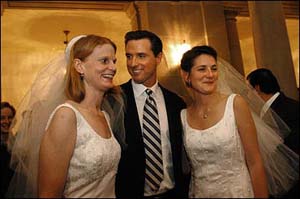 |
Faith under Attack
The Virtue of Saints and the “Rights” of Man
Joseph Sheppard
Much is made today of the “rights” of man. Man would seem to have a right to be perverted, obnoxious, and egocentric if one examines some of the contemporary victories of persecuted sinners using our judicial system.
 |
The "Right" of Lesbians - Above, a lesbian couple boldly poses with San Francisco "Catholic" Mayor Gavin Newsom, who issued licenses to same-sex couples in February 2004. To date, nationwide 13,000 same-sex pairs received such licenses. (Detroit Free Press, April 13, 2004). The supposed right for homosexuals to "marry" challenges the laws of 38 states, which protect marriage and define it as the union between one man and one women.

|
 |
The "Right" to Abortion - Above, presidential candidate Kerry has criticized the Church's opposition to gay marriage. He also votes for a woman's "right" to abort her child.
Sad to say, Archbishop Sean O'Malley of Boston permits Kerry to receive Communion. (BostonHerald.com, April 10, 2004)

|
 |
The "Right" to Be a Homosexual Priest - Fr. Fred Daley, pastor of St. Francis de Sales Church, publicly admitted he was "gay." (Observer-Dispatch.com, March 26, 2004). So far Fr. Daley has received no chastisement from the Catholic Diocese of Syracuse.

|
Although one might claim that they have a free will to practice a pure lack of virtue, it would seem absurd to claim this as a right. Yet this is precisely what is happening today with certain immoral individuals seeking a safe harbor of rationalizations for their evil behavior. A good judicial system should work to free society from that which is harmful. Instead, a morally bankrupt judiciary confuses what a man may do with what a man should do, leaving us with a society with no protection against any “lifestyle” which causes harm.
In examining the lives of saints, one finds no preoccupation with man’s rights, but with the rights of God. The health of the soul is the saint’s first priority, not an absorption with one’s ethnicity, gender or personal preferences. In union with Our Lord in the Garden of Olives the holy man says: “Not as I will, but as Thou wilt.” In the Pater Noster we ask: “Fiat voluntas tua sicut in caelo et in terra.” A saint is not concerned with self except in what way self may serve God.
Many who lived when Our Lord walked this Earth were expecting a Savior that would bring “social justice” to their race. They expected an earthly king that would bring power and wealth to a new earthly Israel. What they discovered was a King of Kings, one whose kingdom was not of this world. Their will was not His will.
Today, whether from the Church’s hierarchy or the speeches of superpower leaders, man continues to look for his own solutions to problems that can only solved through uniformity with God’s will. Some see the United Nations, or a similar organization, as the answer. Others look to a particular form of government, such as a democracy, as a cure. In both cases, God is an afterthought or completely forgotten. Why? Perhaps those that look for solutions in such places believe man to be a god, free of original sin. Nowhere, it would seem, do men in power humbly ask exclusively for God’s help to solve man’s misery.
The irony that exists in this revolutionary tendency of man to seek the “freedom” to do whatever he pleases whenever he pleases, is the resulting slavery to one’s passions. The saint, by practicing great virtue, discovers that true freedom can only result from his will, in conformity with God’s will, dominating the passions.
Simply put, by doing God’s will, we are truly free, and therefore happy. The man who always seeks to satisfy his selfish needs is miserable. Any perceived joy that comes from putting one’s self first is transitory, while those that put God’s desires for us first are rewarded with everlasting happiness.
One can also imagine the contrast between the final hours of life of the soul that has always lived for self and that of the saint. On the one hand, the selfish man realizes, too late, that all that he has or has done will now be gone forever. The saint, however, sees death as not an end, but the fulfillment of his life’s work.
What a pity that the laws of our society that are a reflection of God’s laws are the ones increasingly despised. Laws that were created to protect society from evil tendencies are labeled “unconstitutional” because they somehow limit man’s actions.
In other words, to forbid evil is unconstitutional. This hatred of any restrictions in the law is nothing less than a hatred of God. It is the hatred of Lucifer defying God and saying “I will not serve!” This hatred is shared by those that oppose God’s laws on the basis that is somehow wrong to tell any member of society what they may of may not do. Many, including those that should be the Church’s shepherds, have encouraged others to believe that it is uncharitable to correct the sinner. Perhaps this false notion of charity is the primary cause of our current amoral society. Such an indifference towards God’s laws when faced with the false “rights of man” has caused no small number to conclude that it is an infringement of man’s rights to display His laws publicly.
May we all, with humility, acknowledge our weaknesses for the bad tendencies they are, instead of seeking to justify them. Let us pray that all men will realize that it is only through holy slavery to God’s will that we find true peace and happiness.

Posted April 13, 2004
|
Faith under Attack | Religious | Home | Books | CDs | Search | Contact Us

© 2002-
Tradition in Action, Inc. All Rights Reserved
|
 |
|